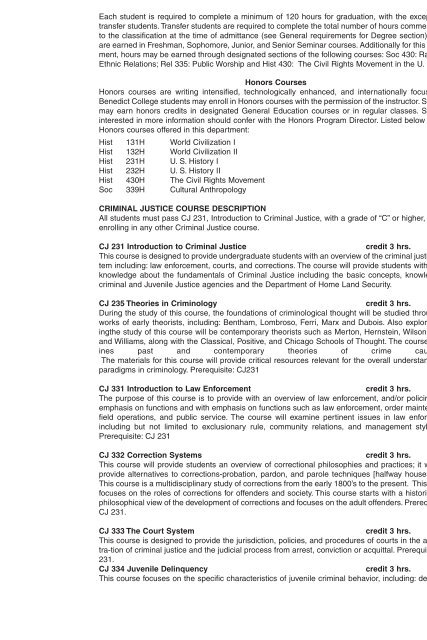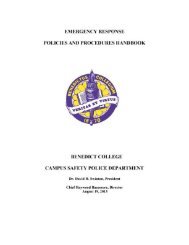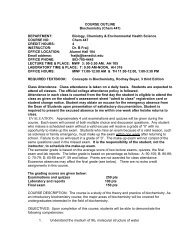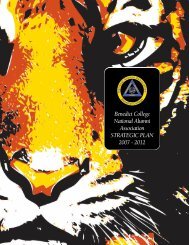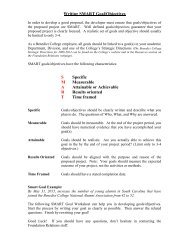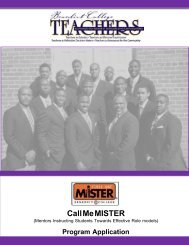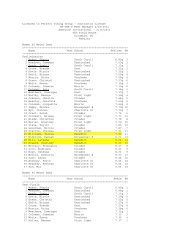2009-2011 - Benedict College
2009-2011 - Benedict College
2009-2011 - Benedict College
You also want an ePaper? Increase the reach of your titles
YUMPU automatically turns print PDFs into web optimized ePapers that Google loves.
SOCIAL SCIENCES AND CRIMINAL JUSTICE DEPARTMENT 183<br />
Each student is required to complete a minimum of 120 hours for graduation, with the exception of<br />
transfer students. Transfer students are required to complete the total number of hours commensurate<br />
to the classification at the time of admittance (see General requirements for Degree section). Hours<br />
are earned in Freshman, Sophomore, Junior, and Senior Seminar courses. Additionally for this department,<br />
hours may be earned through designated sections of the following courses: Soc 430: Race and<br />
Ethnic Relations; Rel 335: Public Worship and Hist 430: The Civil Rights Movement in the U. S.<br />
Honors Courses<br />
Honors courses are writing intensified, technologically enhanced, and internationally focused. All<br />
<strong>Benedict</strong> <strong>College</strong> students may enroll in Honors courses with the permission of the instructor. Students<br />
may earn honors credits in designated General Education courses or in regular classes. Students<br />
interested in more information should confer with the Honors Program Director. Listed below are the<br />
Honors courses offered in this department:<br />
Hist 131H World Civilization I<br />
Hist 132H World Civilization II<br />
Hist 231H U. S. History I<br />
Hist 232H U. S. History II<br />
Hist 430H The Civil Rights Movement<br />
Soc 339H Cultural Anthropology<br />
CRIMINAL JUSTICE COURSE DESCRIPTION<br />
All students must pass CJ 231, Introduction to Criminal Justice, with a grade of “C” or higher, prior to<br />
enrolling in any other Criminal Justice course.<br />
CJ 231 Introduction to Criminal Justice<br />
credit 3 hrs.<br />
This course is designed to provide undergraduate students with an overview of the criminal justice system<br />
including: law enforcement, courts, and corrections. The course will provide students with critical<br />
knowledge about the fundamentals of Criminal Justice including the basic concepts, knowledge of<br />
criminal and Juvenile Justice agencies and the Department of Home Land Security.<br />
CJ 235 Theories in Criminology<br />
credit 3 hrs.<br />
During the study of this course, the foundations of criminological thought will be studied through the<br />
works of early theorists, including: Bentham, Lombroso, Ferri, Marx and Dubois. Also explored duringthe<br />
study of this course will be contemporary theorists such as Merton, Hernstein, Wilson, Kleck,<br />
and Williams, along with the Classical, Positive, and Chicago Schools of Thought. The course examines<br />
past and contemporary theories of crime causation.<br />
The materials for this course will provide critical resources relevant for the overall understanding of<br />
paradigms in criminology. Prerequisite: CJ231<br />
CJ 331 Introduction to Law Enforcement<br />
credit 3 hrs.<br />
The purpose of this course is to provide with an overview of law enforcement, and/or policing, with<br />
emphasis on functions and with emphasis on functions such as law enforcement, order maintenance,<br />
field operations, and public service. The course will examine pertinent issues in law enforcement<br />
including but not limited to exclusionary rule, community relations, and management styles etc.<br />
Prerequisite: CJ 231<br />
CJ 332 Correction Systems<br />
credit 3 hrs.<br />
This course will provide students an overview of correctional philosophies and practices; it will also<br />
provide alternatives to corrections-probation, pardon, and parole techniques [halfway houses, etc.].<br />
This course is a multidisciplinary study of corrections from the early 1800’s to the present. This course<br />
focuses on the roles of corrections for offenders and society. This course starts with a historical and<br />
philosophical view of the development of corrections and focuses on the adult offenders. Prerequisites:<br />
CJ 231.<br />
CJ 333 The Court System<br />
credit 3 hrs.<br />
This course is designed to provide the jurisdiction, policies, and procedures of courts in the administra-tion<br />
of criminal justice and the judicial process from arrest, conviction or acquittal. Prerequisite: CJ<br />
231.<br />
CJ 334 Juvenile Delinquency<br />
credit 3 hrs.<br />
This course focuses on the specific characteristics of juvenile criminal behavior, including: detection,


